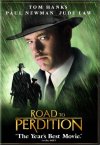BUY THE DVD:
|


|
|
|
SYNOPSIS:
| |
bonds of loyalty are put to the test when a hitman's son witnesses what his father does for a living.
|
|
|
MOVIE FACT:
|
the word "perdition" means enternal damnation.
this film had an 80 million dollar budget.
|
|
|
RATING:
|

one out of four possible stars
|
|
|
|
Sam Mendes helped to win Dreamworks an Academy Award for best picture with his work on American Beauty in 1999. That was his first attempt at directing a feature film. And for his second experience in the director's chair, he has created a film so plodding and heavy that his ability to work magic behind the camera is called into question. In interviews for the film, every one of the film's participants, both those in front of and behind the camera, state what a workhorse Mendes is. Every single person says something like "he's so very much in control; he loves to be entirely in control on his pictures. But the end result is always worth it."
That last sentence is almost tacked on as an afterthought because of how frightened members of the crew seem to be of incurring Mendes's wrath. While American Beauty seemed effortless in its presentation, Road to Perdition seems too constricted to allow one the chance to just sit back and watch it. The execution of the film is quite slow, allowing for stagnant breaks in the movement of action and story, making it easy for one's attention to drift off. Although Tom Hanks, Paul Newman, Jude Law, and even the young Tyler Hoechlin, who plays Hanks's son, give engrossing performances, their time onscreen is spent between moments of extended glares and sub-standard dialogue.
This film was based on a "graphic novel," apparently of the same name, and probably had much more interesting pictures than story. And it is the same with the big screen adaptation. The movie is a beautiful one, showing the audience what a film made in 1930 would be like, if it were shot in color. But all the beauty of the film cannot overcome the lack of surprises in the story. It is not enough that the audience is one step ahead of characters in every scene, but it is also easy to determine what each character will say next. It seems a waste of good acting talent and a talented cinematographer to employ them on a screenplay that is flat, uninteresting, and predictable.
It should be easy to blame David Self, the screenwriter, for this transgression, but it could too easily be the fault of the producers as well. Or, more specifically, the production companies. It is too often the result of creative interference from executives more involved in increasing bank account on the picture that makes for bland dialogue. The money handlers are so concerned with pleasing the widest possible audience that they forget that bigger box office numbers are to be had in making the best possible picture, creatively. A bland picture, no matter if it is designed to appeal to ages seventeen to one-hundred-and-nine, will not get the kind of ticket sales that a picture whose production folks were allowed more freedom.
The stylized way the film is presented, mostly through its camera techniques and set dressings, makes it appear as though it might have actually been made with some sort of boot-leg color film in 1931. The composition of the shots, the exactness of the clothing, and the precise way each shot seems to be edited together make a good combination of classic filmmaking techniques. Conrad Hall, who also shot American Beauty made some of the most creative decisions on this picture. There is, for example, a scene in the rain near the end of the film that takes place between Hanks and Newman's characters that should be placed in a cinematography lesson book.
The attention paid to the look of the film is one of the most successful elements, given that the audio track is less than exemplary. Now, Thomas Newman's score is, of course, beautifully constructed and worth buying on CD, but there are several instances when the dialogue has nothing going for it and Newman's score is nowhere in sight. For example, there is a scene between Hanks and the boy who plays his son, where the two have quite an in-depth conversation and the pauses between what they say seem to stretch out for hours. There were far too many concerted looks in this film and periods of silence. These added to the feeling that the picture wasn't moving fast enough.
And regarding silence, Jennifer Jason Leigh, and particularly Stanley Tucci, were underused as characters. Tucci plays an under boss to Al Capone and every time he is on screen, the film picks up dramatically. He seems to be one of the only characters who was able to make something interesting with his dialogue. Now, although the dialogue in this film sorely hurt the overall product, the performances are good and nearly every character has his moment. Or two. As with Tucci's case. It should be said that the talent in this film, including the actors, the music composer, and the cinematographer, all did their best with the material they were given. But Mendes, as a director, was unable to pull the entire product together into an exciting whole. Which is quite ironic, given the iron fist with which he ruled his set.
Review by Kelsey Wyatt.
| |
|